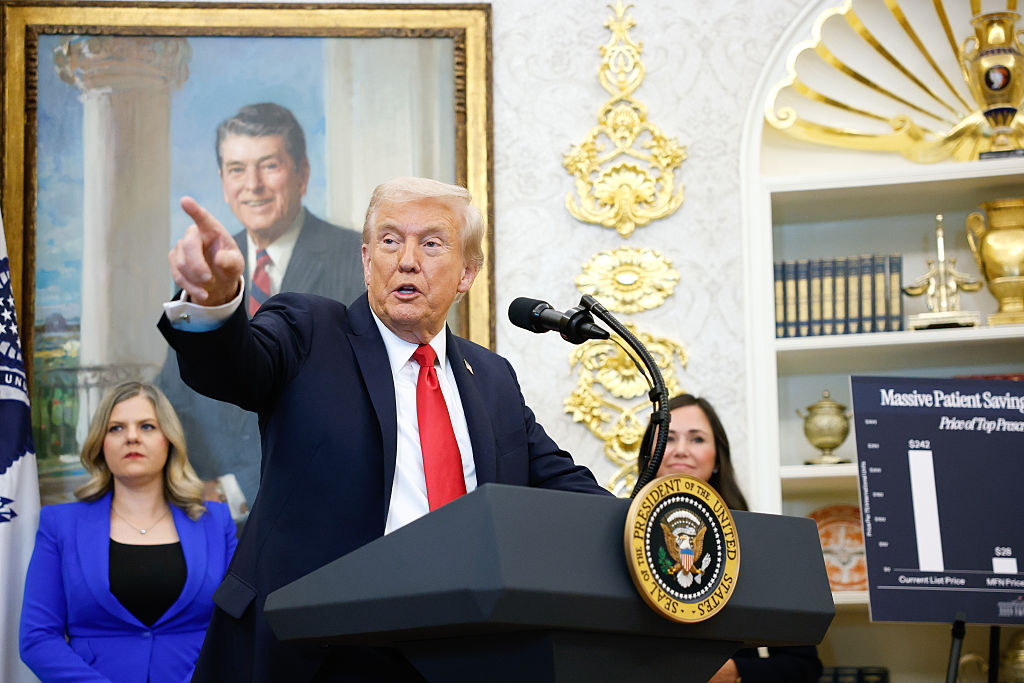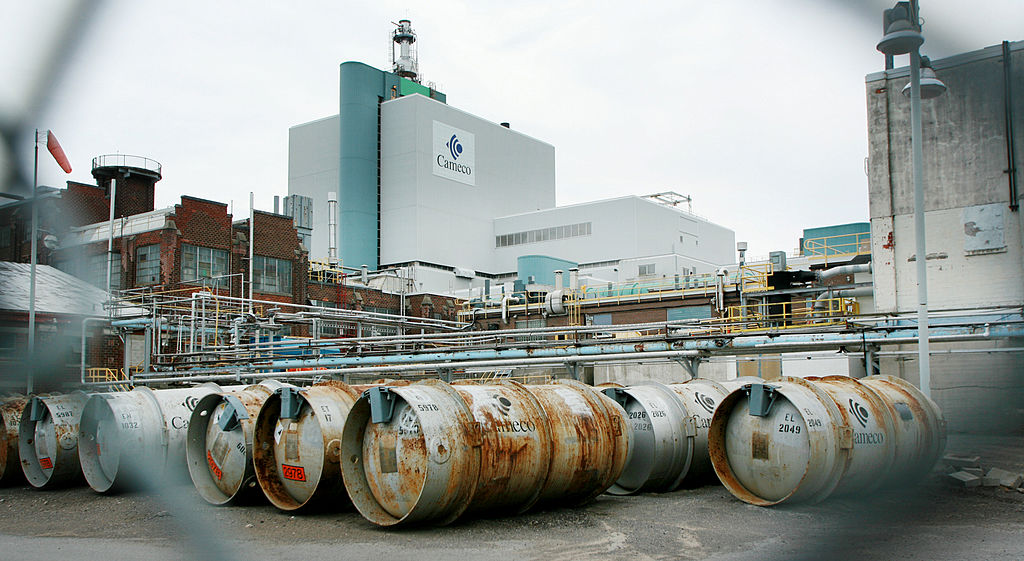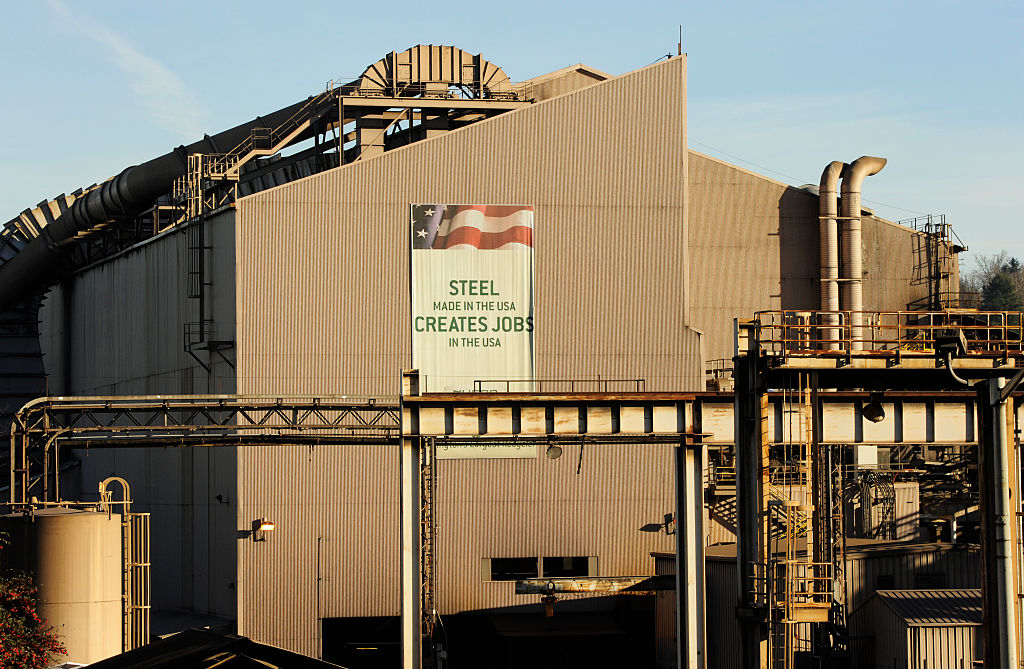5 Stocks to Buy for a Trump Presidency
The second Trump presidency is well underway, and these five stocks are set to benefit.

Profit and prosper with the best of Kiplinger's advice on investing, taxes, retirement, personal finance and much more. Delivered daily. Enter your email in the box and click Sign Me Up.
You are now subscribed
Your newsletter sign-up was successful
Want to add more newsletters?

Delivered daily
Kiplinger Today
Profit and prosper with the best of Kiplinger's advice on investing, taxes, retirement, personal finance and much more delivered daily. Smart money moves start here.

Sent five days a week
Kiplinger A Step Ahead
Get practical help to make better financial decisions in your everyday life, from spending to savings on top deals.

Delivered daily
Kiplinger Closing Bell
Get today's biggest financial and investing headlines delivered to your inbox every day the U.S. stock market is open.

Sent twice a week
Kiplinger Adviser Intel
Financial pros across the country share best practices and fresh tactics to preserve and grow your wealth.

Delivered weekly
Kiplinger Tax Tips
Trim your federal and state tax bills with practical tax-planning and tax-cutting strategies.

Sent twice a week
Kiplinger Retirement Tips
Your twice-a-week guide to planning and enjoying a financially secure and richly rewarding retirement

Sent bimonthly.
Kiplinger Adviser Angle
Insights for advisers, wealth managers and other financial professionals.

Sent twice a week
Kiplinger Investing Weekly
Your twice-a-week roundup of promising stocks, funds, companies and industries you should consider, ones you should avoid, and why.

Sent weekly for six weeks
Kiplinger Invest for Retirement
Your step-by-step six-part series on how to invest for retirement, from devising a successful strategy to exactly which investments to choose.

President Donald Trump is pursuing every limit of his executive power during his second term in the White House, both abroad and at home.
Sworn in as the 47th president on January 20, 2025, Trump has dealt with multiple real wars, making apparent progress in the ages-old Israel-Palestine-Iran conflict. Russia and Ukraine remain an issue, as does the trajectory of Taiwan and China.
More recently, Trump turned his attention to Venezuela, where, in early 2026, his administration ousted President Nicolás Maduro from power.
From just $107.88 $24.99 for Kiplinger Personal Finance
Become a smarter, better informed investor. Subscribe from just $107.88 $24.99, plus get up to 4 Special Issues

Sign up for Kiplinger’s Free Newsletters
Profit and prosper with the best of expert advice on investing, taxes, retirement, personal finance and more - straight to your e-mail.
Profit and prosper with the best of expert advice - straight to your e-mail.
"The U.S. strategy at this point appears to control Venezuela foreign policy, while managing the risk for chaos in the country," say strategists from Wells Fargo Investment Institute. "Over time, the U.S. means to rebuild the country's oil industry and to redirect sales towards the U.S."
While crude oil prices saw an initial pop on the news, they quickly gave back these gains. "The Venezuelan conflict is expected to have minimal impact on global oil prices because the country plays a relatively small role in overall supply," says LPL Financial Chief Economist Jeffrey Roach. "Venezuela currently produces roughly 1% of the world’s crude, and its exports have been constrained for years by sanctions, underinvestment, and infrastructure challenges."
As for energy stocks, Catalyst Funds chief investment officer and senior portfolio manager David Miller says Chevron (CVX) is a "key beneficiary," considering the oil giant has "ongoing operations in Venezuela and could benefit from capex (capital expenditures) in restoring energy production."
How is Trump impacting stocks?
Historically, U.S. presidents have had little direct impact on the stock market.
While particular policies and major public initiatives have created catalysts for certain sectors and industries in the past, presidents have generally avoided "picking winners" among privately held and publicly traded companies.
As is the case in many ways under Trump, things are different. In his second time around as commander in chief, his efforts have expanded to include buying shares in publicly traded companies he deems vital to U.S. national security interests.
As Matthew Housiaux explained in the September issue of The Kiplinger Letter, Trump is "making the government a major shareholder of so-called national champion firms … to shore up the manufacturing base," taking stakes in companies such as Intel (INTC) and Lithium Americas (LAC).
But geopolitics and a broader push into the private sector barely scratch the surface of which stocks could get a lift from Trump's time in the White House.
Here, we look at five stocks to buy for a Trump presidency, representing a variety of industries from banking to crypto to defense.
Bank of America

- Industry: Banks
- Market value: $420.6 billion
- Dividend yield: 2.0%
UBS Global Research analyst Erika Najarian feels banks are in for another year of strong price performance due, in part, to deregulation efforts that include recalibrating capital requirements for large banking institutions. Stabilizing credit quality and accelerating merger and acquisition (M&A) activity could also be tailwinds for financial stocks.
Bank of America (BAC) is one of Najarian's top stock picks for the year. The large-cap stock is trading at an attractive valuation and "gives investors exposure to all the 'good' that is expected out of '26."
Najarian has a Buy rating on BAC, and she's hardly alone in her bullish outlook. Of the 25 analysts covering the stock who are tracked by S&P Global Market Intelligence, 14 say it's a Strong Buy, six have it at Buy, and five rate it at Hold. This works out to a high-conviction consensus recommendation of Buy.
Cameco

- Industry: Uranium
- Market value: $45.3 billion
- Dividend yield: 0.2%
Cameco (CCJ) got a big boost in 2025 when Trump signed an executive order to overhaul the Nuclear Regulatory Commission, which regulates America's existing nuclear reactors and new ones to come.
Under the order, the regulator will be required to decide on applications for the building of new nuclear reactors within 18 months. Trump would like to see nuclear plants of all sizes built in the next few years, including small modular reactors (SMRs).
The executive order also aims to accelerate uranium mining in the U.S., where Cameco doesn't currently operate. But given its two mines in Canada and another in Kazakhstan, it has the expertise to execute in America, too.
BofA Global Securities analyst Lawson Winder says CCJ is a top stock pick for 2026 and his "preferred name in the uranium sector." Cameco is attractively valued relative to its peers, which Winder believes "implies room for multiple expansion, especially given CCJ's exposure to the entire nuclear supply chain. CCJ is the only large, liquid, U.S.-listed vehicle offering exposure to the entire nuclear supply chain."
GE Aerospace

- Industry: Aerospace and defense
- Market value: $341.3 billion
- Dividend yield: 0.4%
GE Aerospace (GE) was one of the hottest stocks of 2025 — generating a total return (price change plus dividends) of 85.7% on the year. A record budget of $900 billion for the Trump administration's Department of War (formerly the Department of Defense) will help keep the wind at GE's back.
Susquehanna International Group analyst Charles Minervo recently initiated coverage on the industrial stock with a Positive (Buy) rating and a $350 price target, representing implied upside of more than 8% to current levels.
"GE Aerospace is at the center of the aerospace and defense industry, providing propulsion technology and advanced engine systems that power many of the world’s commercial and military aircraft," says Minervo. "A vast installed base of 45,000-plus commercial engines and 25,000-plus military engines that are growing at midsingle digits, respectively, should drive robust services revenue growth through the end of the decade."
GE Aerospace is not only one of the top stocks to buy for a Trump presidency, but Kiplinger believes it's one of the best stocks to buy now, period. In addition to being a defense play, "GE is aggressively buying back shares and increasing its dividend," writes Anne Kates Smith, executive editor at Kiplinger Personal Finance. While the stock is expensive at current levels, she adds that it "seems poised to continue its ascent."
Coinbase Global

- Industry: Financial data and stock exchanges
- Market value: $66.3 billion
- Dividend yield: N/A
During his first administration, Trump made clear he was not a fan of digital assets. But while campaigning in 2024 for what would eventually become his second administration, he took to X (formerly Twitter) to announce he'll unveil a "plan to ensure the United States will be the crypto capital of the planet."
Trump has followed through on promises to bring in a more crypto-friendly administration, with successes such as the July 2025 passage of the Guiding and Establishing National Innovation for U.S. Stablecoins Act, or GENIUS Act (PDF), which established a regulatory framework for stablecoins.
The excitement was enough to send bitcoin and Coinbase Global (COIN) to record highs in 2025, but enthusiasm waned toward the end of the year. However, William Blair analyst Andrew Jeffrey says recent crypto market weakness creates an opportunity for long-term investors.
Jeffrey believes Coinbase represents a compelling risk/reward for investors who want exposure to "a burgeoning, if immature and volatile, crypto ecosystem."
Wall Street is anticipating a strong rally in COIN stock. According to S&P Global Market Intelligence, analysts' average price target of $358.27 represents implied upside of nearly 50% in the next 12 months or so.
Nucor

- Industry: Metals and mining
- Market value: $37.7 billion
- Dividend yield: 1.4%
Nucor (NUE) generated a total return of 42% in 2025, outpacing the broader market by more than 24 percentage points. The materials stock got a lift from Trump's tariff policies, which set rates on most steel imports at 50% — and made steel from Canada and Mexico much more expensive.
NUE could see more upside in 2026 thanks to Trump's One Big Beautiful Bill, which encourages companies to manufacture products in the U.S. It also allows these "Made in America" businesses to deduct the entire cost of qualifying items such as machinery and equipment — a notable increase from the previous 40% deduction.
"Nucor's balance sheet is clean, and management has signaled its confidence with recent dividend hikes," says Argus Research analyst Alexandra Yates, who has a Buy rating on NUE. "With Nucor's diverse portfolio and commitment to investing in higher margin businesses, we see potential for share-price gains and continued resilience."
Related content
Profit and prosper with the best of Kiplinger's advice on investing, taxes, retirement, personal finance and much more. Delivered daily. Enter your email in the box and click Sign Me Up.

With over a decade of experience writing about the stock market, Karee Venema is the senior investing editor at Kiplinger.com. She joined the publication in April 2021 after 10 years of working as an investing writer and columnist at a local investment research firm. In her previous role, Karee focused primarily on options trading, as well as technical, fundamental and sentiment analysis.
- Will AshworthContributing Writer, Kiplinger.com
- David DittmanInvesting Editor
-
 Quiz: Do You Know How to Avoid the "Medigap Trap?"
Quiz: Do You Know How to Avoid the "Medigap Trap?"Quiz Test your basic knowledge of the "Medigap Trap" in our quick quiz.
-
 5 Top Tax-Efficient Mutual Funds for Smarter Investing
5 Top Tax-Efficient Mutual Funds for Smarter InvestingMutual funds are many things, but "tax-friendly" usually isn't one of them. These are the exceptions.
-
 AI Sparks Existential Crisis for Software Stocks
AI Sparks Existential Crisis for Software StocksThe Kiplinger Letter Fears that SaaS subscription software could be rendered obsolete by artificial intelligence make investors jittery.
-
 5 Top Tax-Efficient Mutual Funds for Smarter Investing
5 Top Tax-Efficient Mutual Funds for Smarter InvestingMutual funds are many things, but "tax-friendly" usually isn't one of them. These are the exceptions.
-
 Why Invest In Mutual Funds When ETFs Exist?
Why Invest In Mutual Funds When ETFs Exist?Exchange-traded funds are cheaper, more tax-efficient and more flexible. But don't put mutual funds out to pasture quite yet.
-
 Social Security Break-Even Math Is Helpful, But Don't Let It Dictate When You'll File
Social Security Break-Even Math Is Helpful, But Don't Let It Dictate When You'll FileYour Social Security break-even age tells you how long you'd need to live for delaying to pay off, but shouldn't be the sole basis for deciding when to claim.
-
 I'm an Opportunity Zone Pro: This Is How to Deliver Roth-Like Tax-Free Growth (Without Contribution Limits)
I'm an Opportunity Zone Pro: This Is How to Deliver Roth-Like Tax-Free Growth (Without Contribution Limits)Investors who combine Roth IRAs, the gold standard of tax-free savings, with qualified opportunity funds could enjoy decades of tax-free growth.
-
 One of the Most Powerful Wealth-Building Moves a Woman Can Make: A Midcareer Pivot
One of the Most Powerful Wealth-Building Moves a Woman Can Make: A Midcareer PivotIf it feels like you can't sustain what you're doing for the next 20 years, it's time for an honest look at what's draining you and what energizes you.
-
 Stocks Make More Big Up and Down Moves: Stock Market Today
Stocks Make More Big Up and Down Moves: Stock Market TodayThe impact of revolutionary technology has replaced world-changing trade policy as the major variable for markets, with mixed results for sectors and stocks.
-
 I'm a Wealth Adviser Obsessed With Mahjong: Here Are 8 Ways It Can Teach Us How to Manage Our Money
I'm a Wealth Adviser Obsessed With Mahjong: Here Are 8 Ways It Can Teach Us How to Manage Our MoneyThis increasingly popular Chinese game can teach us not only how to help manage our money but also how important it is to connect with other people.
-
 Looking for a Financial Book That Won't Put Your Young Adult to Sleep? This One Makes 'Cents'
Looking for a Financial Book That Won't Put Your Young Adult to Sleep? This One Makes 'Cents'"Wealth Your Way" by Cosmo DeStefano offers a highly accessible guide for young adults and their parents on building wealth through simple, consistent habits.